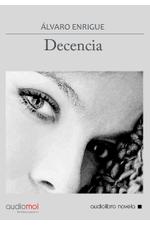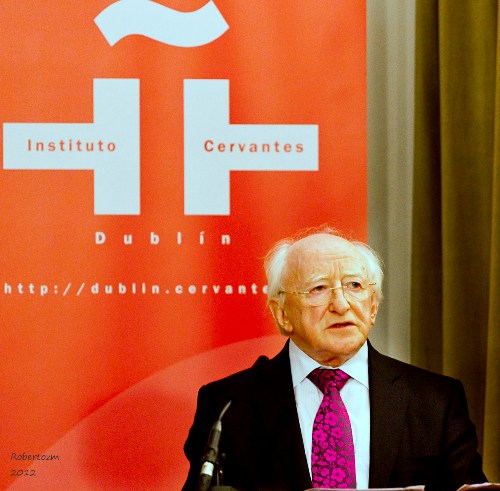Blog del Instituto Cervantes de Dublín
Torre Martello
20 escritores de siete países y miles de historias / 20 Writers from Seven Different Countries and Thousands of Stories
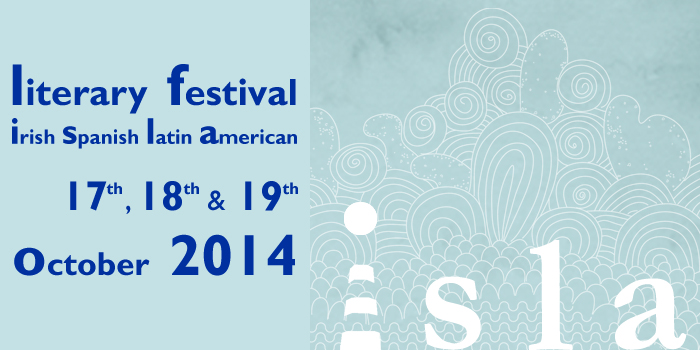
La 3ª edición del Festival Isla de literatura comienza en poco más de una semana. Un festival único en Dublín y en Irlanda. Este año, nuestra «ISLA» (acrónimo de Irish, Spanish and Latin American) recibe la visita de escritores consagrados, prometedores, y la de críticos, traductores y otras personalidades con una fuerte vinculación con el mundo literario de América Latina, España e Irlanda.
John Banville, Premio Príncipe de Asturias 2014, abrirá oficialmente el festival el viernes 17 a las 4 de la tarde y participará en la primera mesa redonda que lleva por título Retratar escribiendo, junto a la vanguardista escritora chilena Diamela Eltit y al multipremiado escritor español José Ovejero. La primera tarde del festival concluirá con el debate «Construyendo identidades» en el que contaremos con la presencia de Donal Ryan, autor de Spinning Heart’s, la poeta y traductora literaria Anamaría Crowe Serrano, y el escritor experimental Christodoulos Makris.
El tema central del sábado, «Nos gustan las historias» comenzará comenzará con la conversación en torno al valor de los cuentos con la presencia de Claire Keegan, el escritor vasco Harkaitz Cano y la poeta irlandesa Mary O’Malley. La segunda mesa redonda del día, «La palabra imprecisa», tendrá como invitados al autor de The Specked People’s, Hugo Hamilton, la poeta gallega Marta Dacosta y el escritor y comunicador irlandés Manchán Magan. Todos ellos abordarán temas como las peculiaridades, ventajas o problemas que supone vivir entre dos o más lenguas. El sábado finalizará con una mesa dedicada a reconocer y repasar el legado literario del gran escritor mexicano Octavio Paz. A esta conversación le seguirá una lectura poética en inglés, español, vasco y gallego.
Pero el sábado no termina ahí porque, especialmente para los interesados en la figura de Gabriel García Márquez y el propio Octavio Paz, la velada continuará con la proyección de los documentales Buscando a Gabo y Vida y obra de Octavio Paz.
El domingo es el día de «Cultura de libros», que comenzará con el debate sobre ficción y realidad en Literaturas enfrentadas con Paul Lynch, autor de Red Sky in Morning, el escritor y comunicador Norirlandés Malachi O’Doherty y el poeta y novelista argentino Américo Cristófalo. Cerraremos el festival con «Acceso a la cultura», con el escritor y comunicador irlandés John Kelly, la directora del semanario El Cultural, la periodista española Blanca Berasategui, y el escritor chileno Waldo Rojas.
Isla es, en definitiva, un festival dedicado a todos los que disfrutan de la lectura, la traducción, la poesía, el cuento y la literatura en general. Un diálogo entre culturas, un encuentro entre tres tradiciones literarias de primer orden y una ocasión inmejorable para acercarse a las letras en español.
¿Dónde?: Instituto Cervantes, Lincoln House, Lincoln Place, Dublin 2.
¿Cuándo?: 17, 18 y 19 de octubre.
Apertura oficial: John Banville, 17 de octubre a las 4 de la tarde.
Entrada libre.
Traducción simultánea en inglés y español.
Texto: Miriam Abuin (prensa) prendub@cervantes.es
The 3rd ISLA Literary Festival sets itself as a unique event in Dublin and Ireland. ISLA (from Irish, Spanish and Latin American) Literary Festival welcomes well known and emerging writers and other personalities with a strong connection to the literary world from these three traditions.
John Banville will inaugurate the festival on Friday 17th at 4pm, and will take part in the first discussion about Portraying Through Writing, in which he will participate with the versatile Spanish writer José Ovejero and the avant-garde Chilean author Diamela Eltit. The evening will conclude with the round table Building Identities with Spinning Heart’s Donal Ryan, poet and literary translator Anamaría Crowe Serrano and the experimental writer Christodoulos Makris.
Saturday’s theme is We All Like Stories. We will commence talking about the value of short stories with Claire Keegan, Basque author Harkaitz Cano and Irish poet Mary O’Malley. In the round table Ambiguous Word, The Specked People’s author, Hugo Hamilton, Galician poet Marta Dacosta and Irish language writer and broadcaster Manchán Magan will discuss the challenges of living in between two or more languages. The last discussion of the day will be dedicated to the cultural and literary legacy of Mexican author Octavio Paz. The panel will be followed by a poetry reading in English, Spanish, Basque or Galician.
For those interested in Gabriel García Márquez and Octavio Paz, they can continue the evening enjoying the screenings of Buscando a Gabo and Vida y obra de Octavio Paz. Both documentaries focus on the personal lives of these Nobel Prize winning writers.
Sunday´s Book Culture will start with the panel about Facing Literatures: Fiction and Non Fiction with the author of Red Sky in Morning Paul Lynch, the Northern Irish writer and broadcaster Malachi O’Doherty and Argentinean poet and novelist Américo Cristófalo. We will close the festival with Access to Culture, with Irish writer and broadcaster John Kelly, the director of El Cultural, Spanish journalist Blanca Berasategui and Chilean writer Waldo Rojas.
ISLA is a multilingual and multicultural event for those who enjoy reading, translation, poetry, short stories, memoirs, travel books or novels. It’s a dialog between cultures, an encounter between these three literary traditions and an incomparable occasion to get close to some of your favourite writers in Spanish.
Location: Instituto Cervantes, Lincoln House, Lincoln Place, Dublin 2
Date: 17th, 18th and 19th October
Opening speech by John Banville, 17th October at 4pm
Free Admission
Simultaneous interpreting available for attendees in Spanish and English
Text by: Miriam Abuin (press officer, prendub@cervantes.es)
No solo de mesas vive el Festival Isla de Literatura / It’s not just about round table discussions
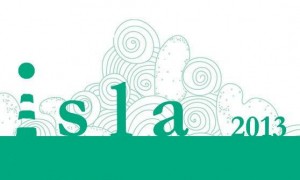 No, en el Festival Isla no solo hay mesas redondas.
No, en el Festival Isla no solo hay mesas redondas.
A lo largo de las últimas semanas hemos estado desgranando en estas páginas los detalles de las mesas redondas que conforman el Festival Isla de Literatura. Pero nuestro festival es mucho más que eso, porque además tendrás la oportunidad de asistir a lecturas en inglés y en español de textos de poesía y narrativa, leídos por sus propios autores, tendrás la posibilidad de comprar sus libros, y tendrás la ocasión de tomarte un café y un tentempié en nuestra sala de exposiciones. Allí mismo podrás encontrarte con los autores que participan en el evento y pedirles que firmen tu ejemplar.
Disfruta de la literatura, en todos los sentidos, en compañía de René Vázquez, Daniel Freidemberg, Tomás Mac Síomóin, Paula Meehan, Kirmen Uribe, Enrique Vila-Matas, John Banville, Eileen Battersby, John Boyne, Julio Espinosa, Álvaro Enrigue, María Tena, Fernando Sánchez Dragó, Marina Carr, Susana Cella y Manuel Gutiérrez Aragón. Estás avisado. ¡Allá tú si te lo pierdes!
No. Isla Festival of Literature is not just about round table discussions.
Over the last few weeks, we have been showing in these pages the details of the round table discussions that will be held during our Festival Isla of Literature. But our festival is much more than that, because you will also have the opportunity to join our readings of poetry and fiction, with texts read by the authors themselves. You will have the occasion to buy their books, and to take a coffee and a snack in our exhibition room. Right there, you can meet the authors participating in the event and ask them to sign your copy.
Enjoy the best literature in the company of René Vázquez, Daniel Freidemberg, Tomás Mac Síomóin, Paula Meehan, Kirmen Uribe, Enrique Vila-Matas, John Banville, Eileen Battersby, John Boyne, Julio Espinosa, Álvaro Enrigue, María Tena, Fernando Sánchez Dragó, Marina Carr, Susana Cella and Manuel Gutiérrez Aragón. You are warned! Don’t miss it!
También hablamos de género en el Festival Isla 2013 / A Question of Genres: Isla Literary Festival 2013
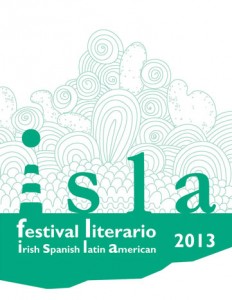 Entramos en la recta final. Llegamos a la semana en la que comienza, este mismo viernes, el Festival Isla de Literatura 2013.
Entramos en la recta final. Llegamos a la semana en la que comienza, este mismo viernes, el Festival Isla de Literatura 2013.
Precisamente en la recta final del festival, en la última mesa redonda que se celebrará el domingo día 20, contaremos con la presencia de Marina Carr, Susana Cella y Manuel Gutiérrez Aragón. Con ellos, Jean Philippe Imbert, profesor de DCU y experto en la materia, hablaremos de géneros. No solo de géneros literarios. También de género sexual. Géneros que tienden a mezclarse, a fundirse, a buscarse y, a menudo, a pelearse entre ellos.
¿Hay un género que domine sobre los demás, que ejerza su poder opresor sobre los otros?, ¿existe un género rey (o reina), o son todos igualmente necesarios? Estas y otras preguntas, y también algunas de sus respuestas, el domingo día 20, a partir de las once de la mañana.
We are now entering the stretch, very close to the beginning of the Isla Literary Festival, this Friday,18th October, 4:00pm.
Precisely, at the end of the Festival, in the last round table discussion to be held on Sunday 2oth, we will receive Marina Carr, Susana Cella and Manuel Gutiérrez Aragón. With them, Jean Philippe Imbert, DCU professor, we will talk about genres.
Genres that tend to overlap, get together, blur lines but, more often, clash with each other. Is there a single genre that dominates the rest and exerts its oppressive power over others? Is there a genre King (or Queen) or are they all equally important? These and other interesting questions, (and maybe some of the answers, who knows!) next Sunday, starting at eleven o’clock in the morning.
Hispanic power / Poder hispano
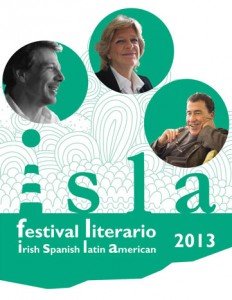 Is there anybody there on the other side of the book? How do readers and writers connect today? Faced with uncertainty, María Tena continues writing and editing, having dedicated her entire life to the world of culture, with eminent roles in this area.
Is there anybody there on the other side of the book? How do readers and writers connect today? Faced with uncertainty, María Tena continues writing and editing, having dedicated her entire life to the world of culture, with eminent roles in this area.
Álvaro Enrigue, literary critic, novelist and Professor of creative writing, hails from the United States, where Hispanic power is becoming increasingly visible. However, is it possible to “create” writers, when it seems like readers tear them apart? How much power does an editor have over the final draft? What about a critic or an agent? Does an author have any power? How powerful are the institutions that set trends?
Fernando Sánchez Dragó, essayist, novelist, anarchist and literary scholar, will also participate in the discussion of these powerful themes.
“Hispanic power” is the title of our fourth round-table discussion in our Isla Literary Festival. Moderated by Catherine Leen.
¿Hay alguien ahí, del otro lado del libro?, ¿dónde se encuentran hoy escritores y lectores? Ante la incertidumbre, María Tena continúa escribiendo y editando tras una vida entera dedicada al mundo de la cultura, con puestos de gran responsabilidad en esta área.
Desde Estados Unidos, donde el «poder hispano» se hace cada vez más visible, llega Álvaro Enrigue, crítico literario, novelista y profesor de literatura creativa. Pero, ¿acaso es posible «hacer escritores» cuando parece que los lectores se «deshacen»? ¿Cuál es el poder del editor sobre la calidad final de la obra?, ¿y de un crítico, de un agente?, ¿tiene algún poder el autor?, ¿cuál es el poder de las instituciones para marcar tendencias?
Sobre estos y otros poderosos temas tendrá también mucho que aportar Fernando Sánchez Dragó, ensayista, novelista, anarquista individualista, sabio de la literatura.
The novel: memory and resistance / La novela: memoria y resistencia
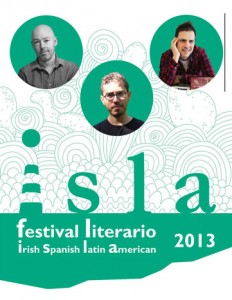 John Boyne, Julio Espinosa and Kirmen Uribe have dealt extensively with the theme of resistance against power in their novels, and they all with be with us on Saturday, 19th October, in our Isla Literary Festival.
John Boyne, Julio Espinosa and Kirmen Uribe have dealt extensively with the theme of resistance against power in their novels, and they all with be with us on Saturday, 19th October, in our Isla Literary Festival.
From the Chilean dictator whose echoes resonate in La fría piel de agosto to the bombing of Guernica that resounds in Lo que mueve el mundo, the Nazi concentration camps in The Boy in the Striped Pijamas and the Russian Czar from The House of Special Purpose, not least forgetting the mutineers from The Bounty. More information on our website!
Uno de los platos fuertes de nuestro Festival Isla será la visita de John Boyne con Julio Espinosa y Kirmen Uribe. Con ellos hablaremos de novela, de memoria y resistencia en una mesa moderada por Cara Levey.
Si toda la obra de Gabriel García Márquez es un retrato del poder, quizás la obra de Mario Vargas Llosa sea un retrato de la resistencia, o de la toma de conciencia frente a ese poder.
John Boyne, Julio Espinosa y Kirmen Uribe han abordado en sus novelas, profusamente, el tema del poder y de la resistencia frente al poder. De la dictadura chilena, cuyos ecos resuenan en La fría piel de agosto, hasta el bombardeo de Guernica que retumba en Lo que mueve el mundo, pasando por los campos de concentración nazis de El niño del pijama de rayas y la rusia zarista de La casa del propósito especial, sin olvidar a unos marineros amotinados en el Bounty.
Más información sobre el festival, cómo no, en nuestra página web.
Isla Festival was presented in Madrid last Friday / El Festival Isla de Literatura fue presentado en Madrid
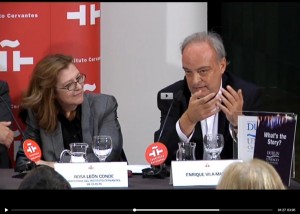 Writers John Banville and Enrique Vila- Matas presented last Friday the Isla Festival of Literature at the Instituto Cervantes in Madrid , an event that will gather in Dublin 16 writers from Spain , Ireland and Latin America .
Writers John Banville and Enrique Vila- Matas presented last Friday the Isla Festival of Literature at the Instituto Cervantes in Madrid , an event that will gather in Dublin 16 writers from Spain , Ireland and Latin America .
The second edition of this festival will be held from the 18th to the 20th October at the Instituto Cervantes in Dublin. Spanish and Latin American literature will be very well represented in Ireland along with the best Irish literature through panel discussions and readings.
As already announced in previous posts on this blog , in the Festival Isla (ISLA is the acronym for Irish Spanish and Latin American) , will participate authors from Argentina , Chile , Cuba , Mexico , Spain and Ireland.
Durin the presentation in Madrid, John Banville recalled the impression of reading in his youth One Hundred Years of Solitude by Gabriel García Márquez , and other Spanish authors , and regretted the lack of presence of Hispanic literature in Ireland. Meanwhile, Enrique Vila- Matas , author of Dublinesca (2010 ) , defined himself as a “literary traveler” who has visited Dublin compulsively (16 times in four years) .
All information about the festival is on our website.
Los escritores John Banville y Enrique Vila-Matas presentaron el pasado viernes en el Instituto Cervantes de Madrid el Festival Isla de Literatura, una cita que reunirá en Dublín a 16 escritores de España, Irlanda y Latinoamérica.
La segunda edición de este festival se celebrará, como sabéis, del 18 al 20 de octubre. A través de mesas redondas y lecturas, la literatura española e hispanoamericana estará presente en Irlanda junto a la mejor literatura irlandesa del momento.
Como ya hemos anunciado en anteriores entradas de este blog, participarán en el Festival Isla (Irish Spanish Latin American Literary Festival), autores provenientes de Argentina, Chile, Cuba, México, España e Irlanda.
En su presentación en Madrid, además de los ya mencionados John Banville y Enrique Vila-Matas, estuvieron presentes los embajadores en Irlanda de Argentina, Chile, México y, cómo no, el embajador de España en Irlanda, Javier Garrigues Flórez.
Banville recordó en su intervención la impresión que le produjo en su juventud la lectura de Cien años de soledad, de Gabriel García Márquez, y de otros autores en español, y ha lamentado la escasa presencia actual de la literatura hispana en su país. Por su parte, Enrique Vila-Matas, autor de Dublinesca (2010), se ha definido como un «viajero literario» que ha visitado «compulsivamente» Dublín (16 veces en cuatro años). Será precisamente sobre los viajes literarios de lo que hablará en ISLA dentro de unos días.
Author of the month / Autor del mes: Enrique Vila-Matas
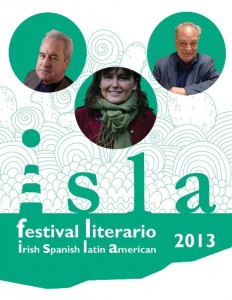
Enrique Vila-Matas estará con nosotros en un par de semanas para celebrar el Festival Isla de Literatura y por ese motivo es nuestro autor del mes.
Enrique Vila-Matas es nuestro autor del mes de octubre. Tendremos la oportunidad de disfrutar de su visita este mes con motivo de su participación en el Festival ISLA, que celebramos en el Instituto Cervantes y nos traerá a grandes autores irlandeses, latinoamericanos y españoles.
Nació en Barcelona en 1948. Es uno de los referentes literarios más importantes de Europa y está traducido en 29 países. Comenzó su carrera literaria en 1971 con Mujer en el espejo contemplando el paisaje y, tras residir en Francia durante varios años, logró un primer gran reconocimiento con su libro Historia abreviada de literatura portátil (1985).Maestro en la escritura de cuentos, sus antologías son consideradas pequeñas obras maestras.
Dentro del terreno de la narrativa ha publicado entre otras Mujer en el espejo contemplando el paisaje, La asesina ilustrada, Nunca voy al cine, Impostura, Historia abreviada de la literatura portátil, Una casa para siempre, Suicidios ejemplares, Hijos sin hijos, Recuerdos inventados, Lejos de Veracruz, Extraña forma de vida, El viaje vertical (con el que ganó el Premio Rómulo Gallegos en el año 2001), Bartleby y compañía (que se hizo con los premios Ciudad de Barcelona, Prix du Meilleur Livre Étranger y Prix Fernando Aguirre-Libralire), El mal de Montano (ganador del Premio Herralde, del Premio Nacional de la Crítica, del Prix Médicis Étranger 2003 y del Premio Internazionale Ennio Flaiano), París no se acaba nunca, Doctor Pasavento (Premio Fundación Lara 2006, Premio de la Real Academia Española 2006 y Premio Mondello), Exploradores del abismo, Dublinesca y Aire de Dylan.
Ha publicado libros a caballo entre la ficción y el ensayo, ensayos puros y libros de artículos. Destacan El viajero más lento, El traje de los domingos, Desde la ciudad nerviosa, Extrañas notas de laboratorio, Aunque no entendamos nada, El viento ligero en Parma y Dietario voluble.
Sus obras son mezcla de ensayo, crónica periodística y novela. Su literatura, fragmentaria e irónica, diluye los límites de la ficción y la realidad.
El escritor argentino Rodrigo Fresán escribió que “una forma más tonta que extraña de definir a Vila-Matas sería afirmar que se trata del más argentino de los escritores españoles. Después de todo, allí están la manía referencial, el humor en serio, los juegos metaficcionales donde el autor es siempre protagonista, las apelaciones cómplices a su lector, y el tránsito cosmopolita, constante y sin compromiso, por las bibliotecas y las ciudades”.
Te esperamos en la biblioteca con una completa selección de la obra de un autor que te fascinará si no lo conocías y al que siempre es un placer releer.
Enrique Vila-Matas takes part in a few day in our Festival Isla of Literature in a round table discussion with John Banville and Eileen Battersby.
Dublin and other Cities of Literature / Dublín y otras ciudades de la literatura
 “Dublin and other Cities of Literature” is the title of the second round-table discussion in our Isla Literary Festival 2013. With John Banville, Eileen Battersby and Enrique Vila-Matas, we will travel from 1950s Dublin, reflected in Benjamin Black´s Vengeance to the modern-day Dublin of Enrique Vila-Matas and Dublinesca, through cosmopolitan landscapes, remote in space and time, inhabited by the characters of John Banville.
“Dublin and other Cities of Literature” is the title of the second round-table discussion in our Isla Literary Festival 2013. With John Banville, Eileen Battersby and Enrique Vila-Matas, we will travel from 1950s Dublin, reflected in Benjamin Black´s Vengeance to the modern-day Dublin of Enrique Vila-Matas and Dublinesca, through cosmopolitan landscapes, remote in space and time, inhabited by the characters of John Banville.
What does it mean to be a City of Literature?
Uno de los platos fuertes de nuestro Festival Isla 2013 será sin duda la mesa redonda protagonizada por John Banville, Eileen Battersby y Enrique Vila-Matas. Con ellos viajaremos desde el Dublín de los años 50, que aparece reflejado en Venganza, de Benjamin Black, hasta el Dublín moderno de Enrique Vila-Matas y su Dublinesca, pasando por los paisajes cosmopolitas, distantes en el espacio y en el tiempo, habitados por los personajes de John Banville.
Audiobooks of the week / Audiolibros de la semana: Álvaro Enrigue
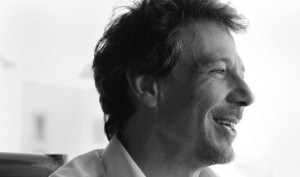 Have you heard about Alvaro Enrigue?
Have you heard about Alvaro Enrigue?
If not, this is a very good chance to start reading and listening his books, because Álvaro Enrigue will be with us during the Isla Festival of Literature that will take place at the Instituto Cervantes from the 18th until the 20th October.
Álvaro Enrigue is one of the most celebrated young Mexican writers at the moment. He has been professor of Literature at the Ibero-American University in Mexico and of Creative Writing in Maryland. Currently, he lives in New York, where he was chosen as resident writer by the New York Public Library in 2011-2012.
During our Isla Literary Festival, he will participate in a round table discussion on Saturday and he will read a selection of his work. Are you going to miss it?
In our Audiobooks platform, you can find two novels written by him.
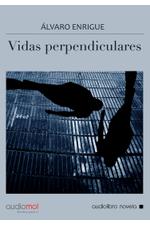
In Vidas Perpendiculares Álvaro Enrique tells us about the life of Jerónimo Rodríguez Loera. He looks apparently like a typical mexican boy, but he is able to feel his father’s fears when he is close to him, and to remember all his past lives.
If you prefer reading than listening, there is a printed version of this book available in our library.
In Decencia you can listen the story of two Mexican guerrilleros in 1973. They kidnap an important bussiness man, Longinos Brumell. When they arrive to Mexico city, a bomb explodes near the consulate of the United States in Guadalajara. This explosion will change completely the whole story.
But you still have one more option. If you prefer shot stories rather than novels, you can also download Hipotermia, a collection published for the firt time in 2004. All these posibilities are just one click away from you. Enjoy them!
¿Conoces ya la obra de Álvaro Enrigue?
Si no es así, ahora es el momento, porque Álvaro estará con nosotros en el Festival Isla de Literatura que se celebrará en el Instituto Cervantes desde el día 18 hasta el 20 de octubre.
Álvaro Enrigue, nació en 1969, es uno de los jóvenes escritores mexicanos más destacados de los últimos años y fue seleccionado por la New York Public Library como escritor residente en 2011-2012. Durante nuestro Festival Isla participará en la mesa redonda titulada «Poder Hispano». ¿Te lo vas a perder?
En la plataforma de descarga de audiolibros de nuestra biblioteca tienes a tu disposición dos novelas de este autor: Vidas perpendiculares y Decencia publicadas en 2008 y 2011 respectivamente.
Hoy, por ello, no te proponemos uno sino dos audiolibros de la semana.
 En Vidas perpendiculares, el autor Álvaro Enrigue nos cuenta la historia de Jerónimo Rodríguez, cuyos rasgos físicos son iguales a los de un típico chico mexicano. Sin embargo, al mismo tiempo, Jerónimo tiene la habilidad de sentir los miedos de su padre cuando está cerca de él, y puede recordar cuáles eran sus sentimientos cuando vivía con una tribu prehistórica o cuando vivía en el siglo XVII en Italia. El autor escribe todas estas vidas pasadas y la presente con un nexo de unión entre todas, la búsqueda del amor.
En Vidas perpendiculares, el autor Álvaro Enrigue nos cuenta la historia de Jerónimo Rodríguez, cuyos rasgos físicos son iguales a los de un típico chico mexicano. Sin embargo, al mismo tiempo, Jerónimo tiene la habilidad de sentir los miedos de su padre cuando está cerca de él, y puede recordar cuáles eran sus sentimientos cuando vivía con una tribu prehistórica o cuando vivía en el siglo XVII en Italia. El autor escribe todas estas vidas pasadas y la presente con un nexo de unión entre todas, la búsqueda del amor.
Si lo prefieres, la versión impresa de este libro también está a tu disposición en nuestra biblioteca.
En Decencia conoceremos la historia de dos guerrilleros mexicanos que secuestran en 1973 a un importante hombre de negocios, Longinos Brumell, quien los ayudará a viajar hasta ciudad de México. Cuando llegan a la capital, de repente, una bomba explota en el consulado de los Estados Unidos en Guadalajara. Esta explosión cambiará por completo el desarrollo de toda la historia.
Y aún te ofrecemos una opción más. Si lo que te gusta son los cuentos, también puedes descargarte Hipotermia, un libro de relatos publicado por primera vez en 2004
Todos ellos están a tu disposición, a un clic que distancia. ¡Que los disfrutes!
Poetry: profession or possesion? / Poesía: ¿profesión o posesión?
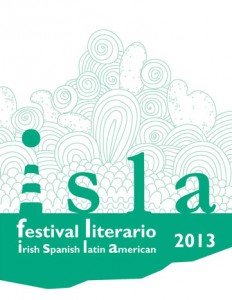 People have always questioned the nature of poetry. Does the poet who writes the poem have control over it, or is it actually the poetry that takes hold of the poet, which he uses to express himself?If the poet is indeed the protagonist, the true essence of poetry, how does it serve him and the role that he plays? What is, or what should be, his relationship with power and the public?
People have always questioned the nature of poetry. Does the poet who writes the poem have control over it, or is it actually the poetry that takes hold of the poet, which he uses to express himself?If the poet is indeed the protagonist, the true essence of poetry, how does it serve him and the role that he plays? What is, or what should be, his relationship with power and the public?
Friday, 18th October, the first round-table in our Isla Literary Festival 2013 presents three poets with very different backgrounds and influences, Miguel Barnet (Cuba), Daniel Freidemberg (Argentina), and Tomás Mac Síomóin (Ireland) will explore these themes that bring us close to Calliope´s heart. Moderated by Lorna Shaughnessy.
Desde siempre, el ser humano se ha preguntado por la naturaleza de la poesía. ¿Es el poeta quien escribe el poema, quien lo domina, o es por el contrario la poesía la que posee al poeta y lo utiliza para expresarse? Y si el poeta es el protagonista, el verdadero centro de la poesía, ¿para qué sirve él y el oficio que desempeña?, ¿cuál es o debe ser su relación con el poder y la res pública?
En la mesa que abrirá nuestro Festival Isla 2013, tres poetas de muy diferentes procedencias e influencias, Miguel Barnet (Cuba), Daniel Freidemberg (Argentina) y Tomás Mac Síomóin (Irlanda) partirán de estos temas rumbo hacia el corazón de Calíope. Moderados por Lorna Shaughnessy.
Dublinesque in Dublin / Dublinesca en Dublín
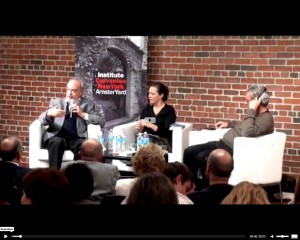 Less than a year ago, Catalan writer Enrique Vila-Matas presented in New York the English translation of his novel Dublinesque, accompanied by his friend Paul Auster.
Less than a year ago, Catalan writer Enrique Vila-Matas presented in New York the English translation of his novel Dublinesque, accompanied by his friend Paul Auster.
In Dublinesque, Samuel Riba, a successful publisher in Barcelona, decides to visit Dublin, a city he has never visited but once dreamed about, on the pretext of honouring James Joyce’s Ulysses on Bloomsday.
Enrique Vila-Matas explains all this much better in his own words in this video recorded at the Instituto Cervantes in New York. We invite you to watch it as a foretaste of what you can see during the Isla Literary Festival that will take place next month in Dublin.
Enrique Vila-Matas is one of our guest writers and he will participate in a round table discussion on Saturday morning with John Banville and Eileen Battersby. He will also participate in the reading session scheduled for Friday, October 18th.
Enrique Vila-Matas presentó en Nueva York, hace poco menos de un año, la traducción al inglés de su novela Dublinesca, acompañado por su amigo Paul Auster. Enrique Vila-Matas contaba entonces cómo su libro es un viaje al corazón de Dublín, de la mano de un editor que convence a sus amigos para que visiten la ciudad de Joyce y Beckett.
Enrique Vila-Matas lo explica mucho mejor en este vídeo que ahora os proponemos, como anticipo de lo que podréis ver durante el Festival Isla de Literatura que se celebrará en nuestro centro el próximo mes de octubre y donde Enrique Vila-Matas será uno de los escritores invitados.
Enrique Vila-Matas participará en una mesa redonda el sábado por la mañana junto a John Banville y Eileen Battersby y también participará en la sesión de lecturas programada para el viernes, 18 de octubre, por la tarde.
Isla Literary Festival 2013 / Festival Isla de Literatura 2013
 Instituto Cervantes Dublin is pleased to present the second edition of the Isla Festival of Literature.
Instituto Cervantes Dublin is pleased to present the second edition of the Isla Festival of Literature.
This is a unique opportunity to attend a gathering of Irish and Hispanic literature where you will enjoy round tables, readings and other parallel events during three consecutive days. This year, on the second edition of this festival we will have 16 authors from Argentina, Chile, Cuba, Ireland, Mexico and Spain. Poetry, novel, essay, theatre and cinema will be the main characters of a pluralistic program for all audiences.
The ISLA Festival or Irish, Spanish and Latin American Literary Festival is a cultural initiative in Ireland carried out by the Instituto Cervantes Dublin in collaboration with the Embassies of Argentina, Chile, Cuba, Spain and Mexico, as well as Dublin UNESCO City of Literature, Ireland Literature Exchange, Poetry Ireland and with kind support of Dublin City University, Trinity College Dublin, NUI Galway and NUI Maynooth.
Poco más de un mes para que de comienzo el Festival Isla de Literatura 2013. En este festival reuniremos a dieciséis escritores de Irlanda, España y Latinoamérica, tres días consecutivos con mesas redondas, lecturas y otros eventos paralelos. En esta edición, contaremos con 16 autores provenientes de Argentina, Chile, Cuba, Irlanda, México y España. Poesía, novela, ensayo, teatro y cine, serán los protagonistas de un programa plural y para todos los públicos.
El Festival ISLA (Irish Spanish Latin American Literary Festival) es una iniciativa cultural puesta en marcha en Irlanda por el Instituto Cervantes de Dublín con la colaboración de las Embajadas de Argentina, Chile, Cuba, España y México, Dublin UNESCO City of Literature, Ireland Literature Exchange, Poetry Ireland y el apoyo de las universidades Dublin City University, Trinity College Dublin, NUI Galway y NUI Maynooth.
[Video] Javier Mariscal en el Festival ISLA de Literatura / ISLA Literature Festival
Comenzamos nuestra serie de entrevistas en video a los invitados que pasaron por el Festival ISLA de Literatura. Muchas de ellas ya están disponibles en nuestro canal de video.
Quizás una de las más esperadas sea la de Javier Mariscal, siempre imprevisible y divertido, que tuvo muy buena acogida durante sus intervenciones en la mesa que se centró en las relaciones entre cine y literatura, así como al día siguiente, durante la presentación de la película dirigida junto a Fernando Trueba, Chico y Rita.
En este video es entrevistado por la también diseñadora e ilustradora Vanesa Zafra. Esperamos que os guste.
Javier Mariscal (Valencia, 1950) is, first and foremost, an image creator who develops his work using all kinds of supports and disciplines. Together with the team of Estudio Mariscal, which he founded in 1989, in recent years, and among many other things, he has done several interior design and graphics (H&M, America’s Cup, Camper, etc), the exhibition of his work Mariscal Drawing Life in the Design Museum of London and two monographic publications: Mariscal Drawing Life and Sketches.
In 2010, he premiered the full-length cartoon film Chico & Rita which he jointly directed with Fernando Trueba and produced the comic Chico & Rita.
In 2011 he published the illustrated book Los Garriris. Chico & Rita has been translated into English in 2011 and has also been published in France and The Netherlands.
Interviewed by Vanesa Zafra.
El presidente Michael D. Higgins en el Instituto Cervantes de Dublín / President Michael D. Higgins in the Instituto Cervantes in Dublin
El presidente de Irlanda, Michael D. Higgins, inauguró oficialmente la primera edición del Festival ISLA de Literatura el pasado 2 de noviembre en el Instituto Cervantes de Dublín. y con ello contribuyó de manera decisiva a su éxito. El festival, por el que pasaron a lo largo del fin de semana cerca de mil asistentes, reunió a escritores de Argentina, Chile, Cuba, México, Irlanda y España en torno a una serie de lecturas, mesas redondas y proyecciones cinematográficas.
El presidente habló ante una sala abarrotada con cerca de 200 personas y les dio la bienvenida en español, irlandés, e inglés. Después de saludar a los asistentes, centró su alocución en los recuerdos de su reciente viaje diplomático por América Latina.
«He regresado recientemente de mi visita a Chile, Brasil y Argentina, una parte del mundo que tiene un lugar especial en mi corazón», dijo Higgins. «Durante este viaje, me llamó la atención una vez más la profundidad del compromiso con la cultura y la literatura irlandesa que existe en América Latina y cómo nuestras dos tradiciones se han influido y enriquecido mutuamente».
Higgins habló después sobre el papel que la escritora Kate O’Brien ha jugado en la literatura irlandesa y española, y la intensa conexión de la autora con España.
El amor del presidente por la poesía también se hizo evidente cuando aplaudió el énfasis que el Festival ISLA de Literatura hizo sobre este género en su programa. «Estoy impresionado por la profundidad y la fuerza de la poesía en este programa. Seamus Heaney, en su magnífica colección de ensayos «The Redress of Poetry», habla de cómo la poesía equilibra «la balanza de la realidad hacia un cierto equilibrio trascendente». El festival ISLA, con sus fuertes elementos interculturales, y los muchos poetas representados en él, como Maighread Medbh y Lorna Shaughnessy, parece tener esa inventiva deliciosa de la que Heaney habla en su obra».
El presidente finalizó leyendo el poema de Oliver St. John Gogarty «An Long» primero en lengua irlandesa y después en inglés.
Información basada en la nota de prensa de Megan Specia y Sergio Angulo.
Michael D. Higgins launched the first Irish, Spanish, and Latin America (ISLA) Literary Festival on the evening of November 2 in the Instituto Cervantes in Dublin. The festival, which brought together writers from Argentina, Chile, Cuba, Mexico, Ireland and Spain, was held over the weekend and featured a series of readings and round table discussions.
The President spoke to a crowd of approximately 200 participants and welcomed them in Spanish, Irish, and English. After greeting the crowd, he spoke to those gathered about a recent diplomatic trip to Latin America.
“I have recently returned from visiting Chile, Brazil, and Argentina, a part of the world which has a cherished place in my heart,” said Higgins. “During these visits, I was struck again by the depth of the engagement with Irish culture and writing that exists in Latin America and how our two traditions have influenced and enriched each other.”
Higgins went on to speak about the role than writer Kate O´Brien has played in Irish and Spanish literature, and the intense connection of the author to Spain.
The President´s love of poetry was also evident when he applauded ISLA´s emphasis on the genre. Said Higgins, “[I am] impressed by the depth and strength of poetic representation in the programme. Seamus Heaney, in his great collection on ´The Redress of Poetry´, speaks of how poetry balances ´the scales of reality towards some transcendent equilibrium´. The ISLA festival, with its strong intercultural elements, and the many poets represented like Maighread Medbh and Lorna Shaughnessy … would seem to have that self-delighting inventiveness of which Heaney speaks.”
He closed by reading Oliver St. John Gogarty´s poem “An Long” (The Ship) first in the Irish language and then in English.
Megan Specia & Sergio Angulo
[Video] Fernando Trueba en el Festival Isla de Literatura / Isla Literary Festival
Fernando Trueba participó en la mesa redonda «Palabras e imágenes: cine y literatura» junto a Mark O’Halloran y Javier Mariscal, moderados por Ciaran Carty. Fernando Trueba es entrevistado por Alfonso Fernández Cid. Edición de video: Cris Méndez.
Cine y literatura, la novela gráfica y cómo surgen historias narradas en imágenes y/o palabras fueron algunos temas de los invitados Javier Mariscal (diseñador), Fernando Trueba (director de cine) y Mark O’Halloran (actor y guionista). Modera: Ciaran Carty.
Fernando Trueba (Madrid, España, 1955) es guionista, editor y director de cine. Entre 1974 y 1979 trabajó como crítico de cine para El País y en 1980 fundó la revista mensual de cine Casablanca, la cual dirigió y editó durante los primeros dos años. En 1992, su película Belle Époque, obtuvo 9 premios Goya y, en 1993, obtiene el Oscar a la mejor película de habla no inglesa. En 1997 publica su libro Diccionario del cine y es editor del Diccionario del Jazz Latino (1998). Recientemente ha llevado al cine, junto al diseñador Javier Mariscal, la película de animación Chico y Rita, que ha recibido el Goya a la mejor película de animación y que fue seleccionada para el Oscar como Mejor Película de animación.
“Words and images, cinema and literature“.
Cinema and literature, graphic novel or how stories told in images or words come to life were some of the topics dealt with by guests Javier Mariscal (designer), Fernando Trueba (cinema director) and Mark O’Halloran (actor, script writer). Chaired by Ciaran Carty.
Fernando Trueba (Madrid, Spain, 1955) is a scriptwriter, editor and film director. Between 1974 and 1979 he worked as a film critic for Spain’s national daily newspaper El País and in 1980 he founded the monthly film magazine Casablanca, which he directed and edited during its first two years.
In 1992, his film Belle Époque received 9 Goya Awards and, in 1993, it was awarded the Oscar for Best Foreign Language film. In 1997 he published the book Diccionario del cine and is the editor of the Diccionario Del Jazz Latino.
He has recently brought Chico & Rita to the big screen working with designer Javier Mariscal. This film was awarded the Goya for Best Animated Film, as well as an Academy Award nomination for Best Animated Film.
